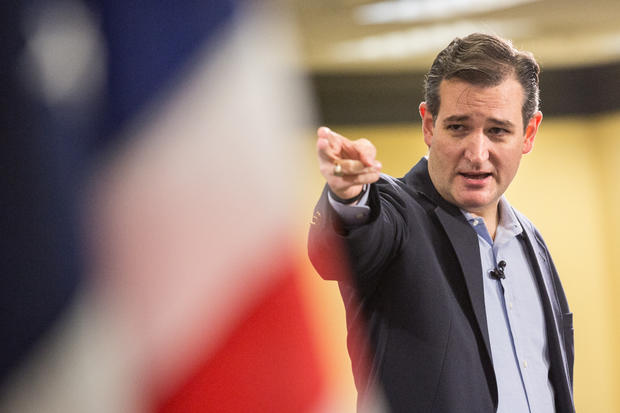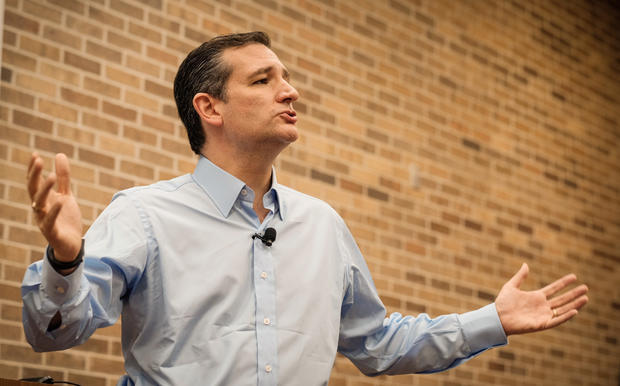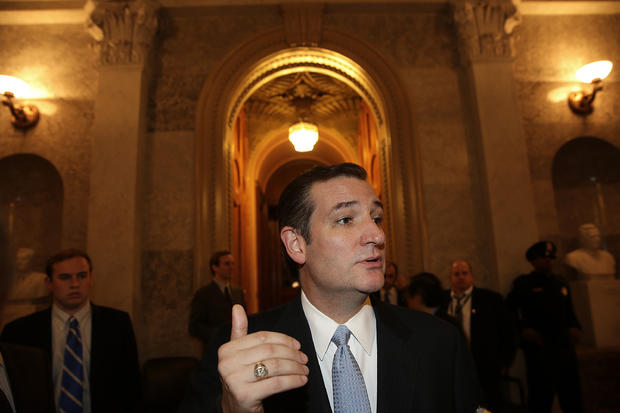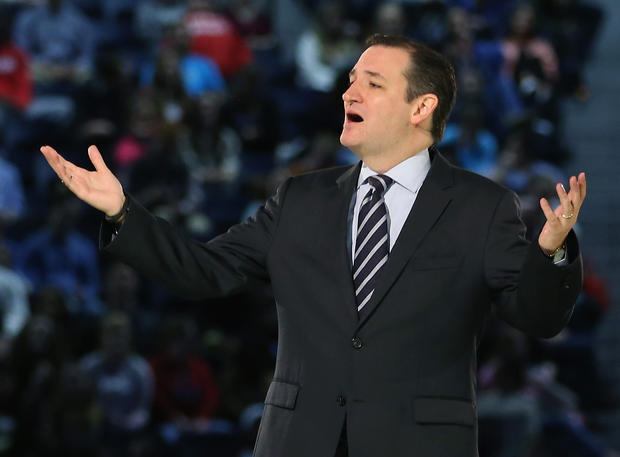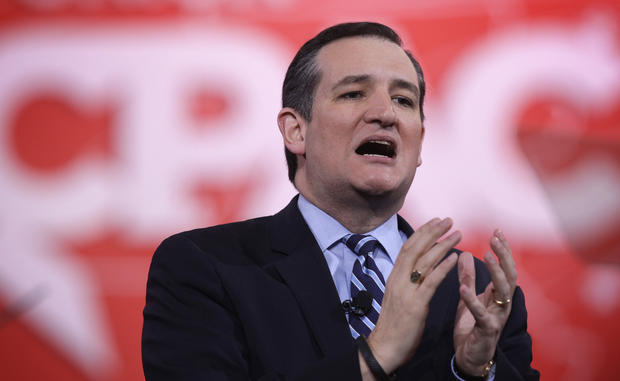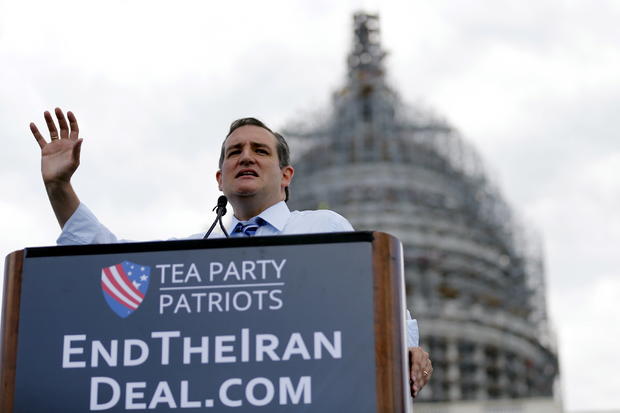Ted Cruz: What does he stand for?
This article is the latest in a continuing series examining where the 2016 candidates stand on five key issues. Click here to read about Jeb Bush, Hillary Clinton, John Kasich, Bernie Sanders, Scott Walker, Marco Rubio, Chris Christie and Ben Carson.
Ted Cruz burst onto the national political scene in 2012 when he beat Texas Lt. Gov. David Dewhurst in the Republican primary for a Senate seat. Dewhurst had the backing of most of the state's Republican establishment, including then-Gov. Rick Perry - who is now competing with Cruz for the 2016 GOP presidential nomination.
From that first upset, Cruz has proven himself to be an unyielding and vocal conservative - often to the chagrin of the Republican leadership in Congress. In 2013, he convinced his fellow conservatives to reject a necessary spending bill because it didn't fully defund the Affordable Care Act, leading to a 16-day government shutdown. He also accused Senate Majority Leader Mitch McConnell, R-Kentucky, of lying to him about a vote to shut down the Export-Import bank, a top target of the right.
Cruz's presidential announcement speech in March highlighted the breadth and depth of his conservatism. He reiterated his commitment to repealing "every word" of Obamacare and called for a "flat tax" that allows "every American to fill out his or her taxes on a post card." He called for "abolishing the IRS," and asked his audience to "imagine a president that finally, finally, finally secures the border." He condemned the federal government for waging an "assault" on religious liberty, and stressed the need to "defend the sanctity of life" and "uphold the sacrament of marriage." He called school choice "the civil rights issue of the next generation," and said he'd like to see the "common core" state education standards abolished.
Here is where Ted Cruz stands on the issues:
Education
"Instead of a federal government that seeks to dictate school curriculum through Common Core, imagine repealing every word of Common Core," Cruz said when he announced his bid for president. "Imagine embracing school choice as the civil rights issue of the next generation, that every single child, regardless of race, regardless of ethnicity, regardless of wealth or ZIP Code, every child in America has the right to a quality education."
Common Core isn't a federal law that can be repealed - rather, the Obama administration offers states financial incentives to use the standards - but Cruz has nonetheless been a staunch opponent for years. He has consistently said that education should be a state and local issue, and he's the cosponsor of a bill that would prevent the federal government from using mandates, incentives, or other forms of coercion to get states to adopt any sort of academic standards or instructional content.
He's also a passionate advocate for expanding charter schools and using vouchers to promote school choice, calling it the "civil rights issue of the next generation."
"Every single child, regardless of race, regardless of ethnicity, regardless of wealth or zip code, every child in America has a right to a quality education. And that's true from all of the above, whether it is public schools or charter schools or private schools or Christian schools or parochial schools or homeschooled," he said at his campaign kickoff.
Immigration
Cruz voted against the 2013 Senate bill that would have given a pathway to citizenship to immigrants in the U.S. illegally and has been one of the most outspoken opponents of President Obama's executive actions that shielded millions of undocumented immigrants from deportation. In 2014, he suggested lawmakers shut down the government rather than fund the agencies that would carry out the president's actions, or that they refuse to confirm any of the president's nominees outside of national security positions.
The amendments he offered to the 2013 bill offer a look at some of his priorities on immigration: More resources for border security (he would have tripled the number of Border Patrol agents and quadrupled their equipment); more green cards, especially for high-skilled workers; and blocking immigrants in the U.S. illegally from receiving any welfare benefits.
Like a few of his fellow Republican presidential candidates, Cruz has repeatedly refused to answer questions about what he would do about the estimated 11 million immigrants who are currently in the country illegally. Secure the border first, he said, and then the country can solve that problem.
He has been vague on the question of whether he would support some sort of legal status for people who came to the U.S. illegally, and he has said that birthright citizenship - automatic citizenship for any baby born on U.S. soil -doesn't make sense because it encourages illegal immigration.
After a San Francisco woman was shot to death earlier this year by an immigrant who had been deported five times, Cruz introduced a bill that would require a mandatory minimum of five years in prison for any immigrant who was deported and illegally re-enters the country. He also supports a bill to withhold funds from sanctuary cities, where local officials do not cooperate with federal immigration enforcement.
Economy
Broadly, Cruz's economic thinking - like that of most Republicans - boils down to calls for a simpler tax code and fewer regulations. His campaign website highlights a long and broad list of actions that he says will boost jobs and economic growth, including pushing for a repeal of the Affordable Care Act, seeking to expand U.S. energy production and sales, and fighting to end the Export-Import Bank, which provides loans and credit insurance to American companies operating abroad.
He wants to create a flat tax, or single tax rate, and a tax code so simple that Americans can fill out their taxes on a postcard. He also calls for completely abolishing the Internal Revenue Service. And Cruz has argued against raising the minimum wage, saying at an event in January, "I think the minimum wage consistently hurts the most vulnerable." In particular, he argued, the effects of raising the federal minimum wage would come down hardest on African-American and Hispanic workers in low-income jobs.
Cruz has also been one of the chief agitators in Congress when it comes to raising the debt ceiling, or the legal amount the U.S. can borrow. He has argued that the Senate should require a higher threshold of 60 votes to increase the debt limit, and he has argued the GOP should extract spending cuts every time the limit needs to be raised.
He hasn't said what kind of health care plan he would use to replace the Affordable Care Act, but has said Americans should be able to purchase insurance across state lines.
Social issues
By choosing to kick off his campaign at Liberty University, the world's largest Christian college, Cruz staked his claim in the fight for the votes of the Christian right.
He's been one of the more vocal candidates on social issues, especially ones that relate to religious freedom. Cruz traveled to Kentucky to visit Kim Davis, the clerk who was jailed for refusing to issue marriage licenses to same-sex couples. He has said that he'll order the Justice Department to investigate Planned Parenthood and bring criminal charges against the organization if necessary in the wake of a series of undercover videos that show doctors from the group bluntly discussing the procurement of fetal body parts for medical research.
Cruz reportedly opposes abortion in all cases except when the mother's life is in jeopardy. In Congress, he is a cosponsor of a bill that would ban abortion after 20 weeks of pregnancy, and he also led the charge to block a billpassed by the Washington, D.C. government that would have prevented employers in the city from taking action against employees that use contraception or terminate a pregnancy. Cruz and other conservatives said the measure would require religious organizations to pay for abortions by violating their faith.
As Texas' solicitor general, Cruz successfully led a group of states in defending New Hampshire's parental notification laws for abortion at the Supreme Court.
After the Supreme Court ruled that same-sex marriage is legal, Cruz said the justices "undermined the fundamental legitimacy of the United States Supreme Court." He called for two constitutional amendments: One to preserve the right of individual states to define marriage as the union of a man and a woman, and another to subject Supreme Court justices to "periodic judicial retention elections."
"The union of a man and a woman has been the building block of society since the dawn of history, and the people in numerous states have repeatedly affirmed that truth in their laws. Nothing in the Constitution prohibits that," Cruz has said.
Foreign policy
Cruz has become an outspoken voice in opposition to the nuclear deal with Iran, promising to undo the agreement on his first day in office and saying at a rally in September "with absolute certainty, people will die," if it's implemented. He said it's "the single greatest national security threat facing America."
He's been critical of the Obama administration on nearly every other foreign policy issue as well. He belittled the administration's efforts to fight the Islamic State of Iraq and Syria (ISIS) as a "photo-op campaign" and said that the U.S. should use "overwhelming air power" to defeat the group. He has not ruled out the use of American ground troops, but says that the U.S. should principally rely on Kurdish Peshmerga forces.
For all his criticism of the president, however, Cruz still advocates for a less muscular foreign policy than that of the last Republican president, George W. Bush.
"I don't think we should be engaged in nation-building," he told Fox News in June. "It's not our job to turn foreign nations into democratic utopias, to try to turn Iraq into Switzerland. It is the military's job to hunt down and kill our enemies, to kill ISIS before they murder American citizens and they wage jihad."
To push Russian President Vladimir Putin out of Ukraine, Cruz has argued for more vigorous sanctions against Russia and exporting liquid natural gas to make Ukraine less dependent on Russian energy sources. He also has also said the U.S. should install anti-ballistic missile batteries in Poland and the Czech Republic to protect Eastern Europe.
He has also been a vocal supporter of Israel, has called the Obama administration "the most anti-Israel administration this government has ever had" and promised to move the U.S. embassy from Tel Aviv to Jerusalem on his first day in office.
On issues of government surveillance, he has reached across the aisle to craft legislation limiting the powers of the National Security Agency (NSA). He was a co-sponsor of the USA Freedom Act, which overhauled the NSA's bulk collection of phone records and leaves those records in the hands of private telecommunications companies.
